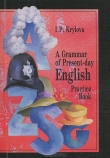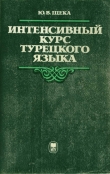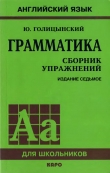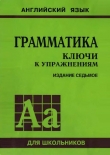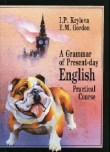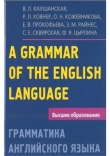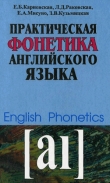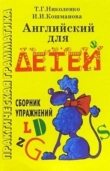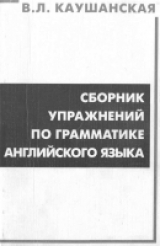
Текст книги "Сборник упражнений по грамматике английского языка"
Автор книги: Валентина Каушанская
Жанры:
Учебники
,сообщить о нарушении
Текущая страница: 15 (всего у книги 20 страниц)
Exercise 22. Follow the direction for Exercise 21.
1. He was extremely considerate; he was very attentive to her comfort; she never expressed the slightest wish without his hastening to gratify it. When she happened to feel ill no one could have been kinder or more thoughtful. She seemed to do him a favour when she gave him the opportunity of doing something tiresome for her. And he was always exceedingly polite. He rose to his feet when she entered a room, he gave her his hand to help her out of a car; if he chanced to meet her in the street he took off his hat, he was solicitous to open the door for her when she left a room... He treated her not as Kitty had seen most men treat their wives, but as though she were a fellow-guest in a country house. (Maugham)2. Wilson looked around and saw Goldstein sitting alone at the next tent, writing a letter. Abruptly, it seemed shameful to Wilson for them to drink without including anyone else in the squad. For a few seconds he watched Goldstein scribing busily with a pencil, moving his lips soundlessly... (Mailer)3. That angry afternoon appeared to have happened so long ago that to apologize now for what had been said was foolish. Haviland seemed to have forgotten the bitterness entirely. «The thing to do now, Erik,» he said, «is to close up, go home and sleep for a day or two.» (Wilson)4. Next morning, meeting me in the hall, she told me that she was too tired to go out with the guns. It was the first time I had known her energies flag. She was still enough herself to give me instructions. (Snow)5. The tongue of Fleur's dog licking his dabbled hand interrupted this somewhat philosophic reflection. Animals were too human nowadays, always wanting to have notice taken of them... (Galsworthy)6. Perhaps having written this to you I may never show it to you or leave it for you to see. But yet I must write it. Of all conceivable persons you, when you have grown to manhood, are the most likely to understand. (Wells)7. He lay in bed, dressed, with the light burning, until he heard the clock strike three. Then he left the house, putting his watch and his tobacco pouch into his pocket. (Faulkner)8. That" evening the instinct vouchsafed at times to lovers in place of reason caused him to pack his bag and go to Cannes. (Galsworthy)9. He sat there in the little waiting room, wearing an old cloth cap that Ronnie had found at the back of the car and. insisted upon his taking. The only other people, a sleepy elderly country couple... did not seem to notice anything surprising about his appearance. (Priestley) 10. He followed the direction of her glance. They stood facing the windows that led out on the verandah. They were shuttered and the shutters were bolted. They saw the white china knob of the handle slowly turn. They had heard no one walk along the verandah. It was terrifying to see that silent motion. A minute passed and there was no sound. Then, with the ghastliness of the supernatural in the same stealthy, noiseless and horrifying manner, they saw the white china knob of the handle at the other window turn also. It was so frightening that Kitty, her nerves failing her, opened her month to scream; but, seeing what she was going to do, he swiftly put his hand over it and her cry was smothered in his fingers. Silence. She leaned against him, her knees shaking, and he was afraid she would faint. Frowning, his jaw set, he carried her to the bed and sat her down upon it. (Maugham)11. He [Francisl would not appear to be encouraging his daughter to marry a fortune. It amused me, having known Francis since we were both young. I had seen him, less orthodox than now, marrying for love, but also marrying into a rich family. (Snow)12. Erik wanted them to like each other because he cared for them both, but he suddenly dreaded the thought of their becoming friendly because he had a conviction that they could form a friendship which would have no real need of him. He interrupted to make Mary talk shop. (Wilson)
Exercise 23. Translate into English, using verbals where possible.
1....когда княжна Марья, опустив шторы, хотела выйти, Наташа позвала ее к себе. (Л. Толстой)2. Она [Наташа] высунула голову в сырой воздух ночи, и графиня видела, как тонкая шея ее тряслась от рыданий... Наташа знала, что стонал не князь Андрей... но этот страшный неумолкавший (never-ceasing) стон заставил зарыдать ее. (Л. Толстой)3. Ростов, не желая навязывать свое знакомство княжне (to force something on somebody), не пошел к ней, а остался на деревне, ожидая ее выезда (to drive out). (Л. Толстой)4....в голове его [Пьера] мелькнула мысль, что действительно хорошо бы было, даже ежели бы и взяли Москву, ему остаться в ней... (Л. Толстой)5. Проснувшись от своей болезни (to come to oneself after one's illness), Пьер увидел... своих двух людей, приехавших из Москвы, – Терентия и Ваську, и старшую княжну, которая... узнав о его освобождении и болезни, приехала к нему, чтобы ходить за ним. (Л. Толстой)6. Высокий, плешивый старый человек... стоял в передней; увидев Пьера, он сердито пробормотал что-то и ушел в коридор. (Л. Толстой) 7. Гости отправились в комнаты для них отведенные. (Пушкин) 8. Но Дефорж стоял уже перед нею. «Благодарю вас, – сказал он ей тихим и печальным голосом, – что вы не отказали мне в моей просьбе...» Марья Кириловна отвечала заготовленною фразой: «Надеюсь, что вы не заставите меня раскаяться в моей снисходительности». (Пушкин)9. Взволнованная свиданием с Дубровским, Марья Кириловна возвращалась из саду. (Пушкин)10. Обед, продолжавшийся около трех часов, окончился. (Пушкин)11. Между тем лошади пришли, и смотритель (postmaster) приказал, чтоб тотчас... запрягали их в кибитку (to harness to) проезжего; но, возвратясь, нашел он молодого человека почти без памяти лежащего на лавке: ему сделалось дурно, голова разболелась, невозможно было ехать. (Пушкин)12. Постояв (to stand still) несколько секунд, она [Анна] вошла в вагон и села на свое место. (Л. Толстой)13. Он обнял Левина и, говоря с ним, не замечал Вронского, который встал и спокойно дожидался, когда князь обратится к нему. (Л. Толстой)14. Когда он [Левин] увидел, что его ожидания сбылись, что ничто не мешает ему высказаться (to speak), лицо его сделалось мрачно. (Л. Толстой)15. Он [Левин] встал, чтобы идти к письменному столу, и Ласка, лежавшая у его ног... тоже встала и оглядывалась на него, как бы спрашивая его, куда идти. (Л. Толстой)16. Кити знала, что княгиня была оскорблена тем, что госпожа Шталь как будто (to seem) избегала знакомиться с нею. (Л. Толстой)17. Он [Левин] сел опять, ожидая приезда гостей, чтобы уехать незаметно (unnoticed). (Л. Толстой)18. Ему так хорошо удалось уговорить брата посоветоваться (to consult) с доктором и ехать па воды заграницу (foreign watering-place)... что в этом отношении он был собой доволен. (Л. Толстой)19. «Извините меня, княгиня, – сказал он [Каренин], учтиво улыбаясь, по твердо глядя ей в глаза,—но я вижу, что Анна не совсем здорова, и желаю, чтоб она ехала со мною». (Л. Толстой)20....шаги лакея заставили ее очнуться (to rouse oneself), и, скрыв от него свое лицо, она притворилась, что пишет. (Л. Толстой)21 __ Анна села с письмом Бетси к столу и, не читая, приписала внизу (to write below): «Мне необходимо вас видеть. Приезжайте к саду Вреде. Я буду там в 6 часов». (Л. Толстой)22. Он (Вронский]... радовался тому, что благодаря этому дождю наверное застанет ее дома и одну, так как знал, что Алексей Александрович, недавно вернувшийся с вод (foreign watering-place), не переезжал из Петербурга. (Л. Толстой)23. Она [Анна] вышла в столовую... и нарочно громко говорила, ожидая, что он придет сюда; но он не вышел, хотя она слышала, как он выходил к дверям кабинета, провожая (to take leave) правителя канцелярии (chief secretary). (Л. Толстой)24. Он любил удить рыбу и как будто (to seem) гордился тем, что может любить такое глупое занятие. (Л. Толстой)25. Павел Петрович улыбнулся и, положив руку на плечо брату, заставил его снова сесть. (Тургенев)26. Ее случайно увидел некто Одинцов, очень богатый человек лет сорока шести...; влюбился в нее и предложил ей руку. (Тургенев)27. Разговаривая вечером с Катей, Аркадий совершенно позабыл о своем наставнике. (Тургенев) 28.... они, кажется, взаимно презирали друг друга... (Л. Толстой) 29. Посмотрев на часы, увидел он, что время ехать. (Пушкин) 30. Герман был сын обрусевшего немца, оставившего ему небольшой капитал (fortune). (Пушкин)31....однажды Лизавета Ивановна, сидя под окошком за пяльцами, нечаянно (to happen) взглянула на улицу и увидела молодого инженера, стоящего неподвижно и устремившего глаза к ее окошку. (Пушкин)32. На стене висели два портрета, писанные (to paint) в Париже m-me Lebrun. (Пушкин)33. Старуха молча смотрела на него и, казалось, его не слыхала. Герман вообразил, что она глуха, и, наклонясь над самым ее ухом, повторил ей то же самое. (Пушкин)34. Случилось так, что в числе горничных Анны Павловны находилась одна очень хорошенькая девушка... (Тургенев)35. Лиза вошла в комнату и, увидев Лаврецкого, покраснела. (Тургенев)36. Лаврецкий походил около сада в смутной надежде встретиться с Лизой, но не увидел никого. (Тургенев)37. Они сидели возле Марфы Тимофеевны и, казалось, следили за ее игрой (the game)... (Тургенев)38. “Я желаю, чтобы вы меня простили», – проговорила Варвара Павловна, не поднимая глаз. (Тургенев)39. M-me Schoss, ходившая к своей дочери, еще больше увеличила страх графини рассказами (to describe) о том, что она видела на Мясницкой улице... (Л. Толстой)40....оставшись один в маленькой комнатке, он долго ходил в ней взад и вперед... (Л. Толстой)41. Забыв опасность быть узнанным, Ростов подвинулся... к самому крыльцу (the steps). (Л. Толстой)42. В соседней избе лежал раненый адъютант Раевского с разбитой кистью руки, и страшная боль...заставляла его жалобно... стонать. (Л. Толстой)43. Княжна Марья произвела на него приятное впечатление под Смоленском. То, что он встретил ее тогда в таких особенных условиях, н то, что именно на нее одно время указывала ему мать, как на богатую партию, сделали то, что он обратил на нее особенное внимание. (Л. Толстой)44. Наполеон стоял... на Поклонной горе и смотрел на открывавшееся (to lie) перед ним зрелище. Москва... казалось, жила своей жизнью. (Л. Толстой)45. Переодевшись в придворный мундир, monsieur de Beausset приказал нести впереди себя привезенную им императору посылку... (Л. Толстой)
THE ADVERB
Exercise 1. State the morphological composition of the following adverbs
Where, abroad, too, tenfold, nowadays, inside, quickly, underneath, once, homeward, seldom, nowhere, heartily, afoot, headlong, twice, beyond, then, eastward, otherwise, upstairs, rarely, late, outside, ahead, forever, so, beneath, forward, fast, scarcely,' inquiringly, sometimes, good-naturedly.
Exercise 2. Point out the adverbs and define the group each belongs to.
I. She talked to them naturally, sang a little song to them... And gave them their Sunday toys. (Buck)2. He [Jolyon] was free to go off with his easel where and when he liked. (Galsworthy) 3. The man must have had diabolically acute hearing. (Wells) 4. Patients insist on having microbes nowadays. (Shaw)5. As soon as Annette found herself outside, she began to run. (Murdoch)6. I never felt better in my life. (Saroyan)7. I think sometimes there is nothing before me but hard work... (Galsworthy)8. It was as if his soul had been cramped and his eyes bandaged from the hour of his birth. Why had he lived such a life? Why had he submitted to things, blundered into things? (Wells)9. Yes, George had lived too fast, or he would not have been dying twenty years before his time – too fasti (Galsworthy)10. She consulted her husband at once. (Galsworthy)11. Fleur having declared that it was «simply too wonderful to stay indoors,» they all went out. (Galsworthy) 12. And she lived at Mapledurham a jolly name, too, on the river somewhere. (Galsworthy)13. A week later I am visited by a very stylishly dressed young woman. (Saroyan)14. They had been dancing together. (Dreiser)15. He (SoarnesJ remembered her birthday well – he had always observed it religiously. (Galsworthy)16. The driver, was ordered to take the car to the pool, and Jates and Karen went afoot. (Heym)17. The only thing is to cut the knot for good. (Galsworthy)18. Why, you've hardly started, it isn't fair to bother you. (Cronin)19. Twice I doubled round corners, thrice I crossed the road and came back on my tracks. (Wells)20. They went eyeing each other askance.. (Galsworthy)21. He took a few steps towards her and looked less at her than at the open doorway behind her... (Greene)22. In another moment Adyl was leading the way downstairs. (Wells)23. Soames looked at her hard (Galsworthy)24. The boy was due to go to-morrow. (Galsworthy)25. She seems to be simple enough. (This is America)26. It [the cry] came from the terrace below. (Galsworthy)27. They are quiet at– present. (Galsworthy)28. I must get the money somehow. (Shaw)29. He [Soames] had never had a love of music. (Galsworthy)30. He spoke little and listened much. (Horgan)
Exercise 3. Use the comparative or superlative degree of the adverbs.
1. Then the bus... began to run, __ still, through a long avenue, (fast) (Faulkner)2....moreover, he was __ educated than the others, (well) (Buck)3. She was the one who was being hurt __. (deeply) (Wilson)4. He contrived to get a glimpse of Montanelli once or __ in every week, if only for a few minutes. (often) (Voynich)5. Driving __ now, she arrived between four and five, (slowly) (Galsworthy)6. However, I must bear my cross as __ I may. (well) (Shaw) 7. Then he dismissed the thought as unworthy and impossible, and yielded himself __ to the music. (freely) (London)8. He followed her mental process __ now, and her soul was no __ the sealed wonder it had been, (clearly; long) (London)9. Felix's eyebrows rose __ than ever, (high) (James) 10. It was a comfort to Margaret about this time, to find that her mother drew __ and __ towards her than she had ever done since the days of her childhood, (tenderly; intimately) (Gaskell)
MODAL WORDS
Exercise I. Point out all the modal words and define their meaning.
1. Over the ridge she would find him. Surely she would find him. (Wells)2. He had stopped their mouths, maybe, but at what a cost. (Galsworthy)3. She s just engaged to him. Of course she is frightfully excited about it, and naturally he wants her to come away and marry. [Wells) 4. Winifred could barely get a word out of him, he ate nothing, but he certainly took his liquor and his face kept getting whiter. (Galsworthy)5. She was probably dissatisfied just as he was. (Dreiser)6. Knowledge of something kept from her made him, no doubt, unduly sensitive. (Galsworthy)7. The Buccaneer, watching him go so sadly, felt sorry perhaps for his behaviour to the old man. (Galsworthy)8. Thorp was actually too sick to see anybody. (Heym)9. «Allow me, Sir, the honour of grasping your hand – permit me, Sir, to shake it,» said the grave man. «Certainly,» said Mr. Pickwick. (Dickens)10. My dear Ma'am, you deserve a very excellent husband—you do indeed. (Dickens)11. Bertine and I are just on our way home, truly. (Dreiser)12. He saw Fleur, standing near the door, holding a handkerchief which the boy had evidently just handed to her.. (Galsworthy)
THE INTERJECTION
Exercise 1. Point out all the interjections and say whether they are emotional or imperative.
1. «The Boers are a hard nut to crack, uncle James.» «H'm!» muttered James. «Where do you get your information? Nobody tells.» (Galsworthy)2. «Oh! My eyel» he said looking very lowspirited, «I am sorry for that.» (Galsworthy)3. «Good Lord!» said Fleur. «Am I only twenty-one? I feel forty-eight.» (Galsworthy)4. «Good Heavensl» cried my mother, «you'll drive me mad!» (Dickens)5. Heavens! How dull you arel (Sheridan) 6. «Oh, Karen,» he said, «it's good to have you around!» (Heym)7. Alas! The white house was empty and there was a bill in the window. (Dickens)8. A man jumped on top of the barricade and, waving exuberantly, shouted. «Americains! Hurrah.» (Heym)9. Hallo, Michael! I'm rather late; been to the club and walked home. (Galsworthy)10. Ah! you are both of you good-natured. (Sheridan) 11. «Hark!» cried the Dodger at this moment, «I heard the tinkler,» catching up the light, he crept softly upstairs. (Dickens)12. «Who is that?» she cried. «Hush, hush!» said one of the women, stooping over her... (Dickens)13. Well, I don't like those mysterious little pleasure trips that he is so fond of taking. (Voynich)14. Now, Maria, here is a character to your taste... (Sheridan) 15. Here! I've had enough of this. I'm going. (Shaw)
THE PREPOSITION
Exercise 1. State the morphological composition of the following prepositions:
In, below, with regard to, during, concerning, till, in front of, without, behind, under, in view of, outside, off, into, until, across, according to, with, along, up, inside, out of, owing to, at, regarding.
Exercise 2. Insert prepositions and define their meaning where possible.
1. The life __ the Dutch settlement now began to be built into the life __ the American nation. This these people did consciously and __ their own will, although there were – the older ones some who longed, as did even Mijnheer Stulting __ times, __ the comfort and security __ his old home. It had been a sad blow __ him when the pastor died __ the early years and lie was never again satisfied altogether __ any who tried to take his place. (Buck)2. Bitterly tired, he lay down __ the sofa __ his fur coat and fell asleep. (Galsworthy)3. __ the appointed time __ the evening Mr. Micawber reappeared. (Dickens)4. They were __ earnest conversation. __ time __ time they would halt and one __ them would, it seemed, explain something __ the other, who __ turn would nod his head sagely. (Clark)5. There was only one other event __ this hall-year,... that made an impression __ me which still survives. (Dickens)6. He reached his house __ midnight. (Galsworthy)7. He looked __ his watch. __ half an hour the doctor would be back. (Galsworthy) 8. Bing went __ the soldier, who had the serious face __ a child thrown __ the world too soon. (Heym)9. He stared __ her __ amazement. He had forgotten that she was ignorant __ his story and __ his flight __ Carlion. (Greene)10. __ these studies the excellent Mrs. O'Dowd was __ great assistance __ him. (Thackeray)11. A child __ 1901, he had come __ consciousness when his country, just over that bad attack __ scarlet fever, was preparing __ the Liberal revival __ 1906. (Galsworthy)12. Mrs. Reed's hands still lay __ her work inactive, her eyes __ ice continued to dwell freezingly __ mine. (Ch. Bronte)13. When __ the first week __ December he decided to go __ Paris, he was far __ admitting that Irene's presence was influencing him. (Galsworthy)14. Stroeve was, of course, delighted __ her. He could not do enough to show his gratitude __ the whole hearted devotion __ which she had accepted the burden he laid __ her. (Maugham)15. Just before Christmas, Reggie Burnside passed __ London __ his way __ Murren. He dropped __ Elizabeth's studio ir _ tea. (Aldington)16. One autumn morning I was __ my mother __ the front garden, when Mr. Murdstone, I knew him __ that name now, came by __ horseback. (Dickens) 17. He was proud __ this enlistment; proud __ his boy forgoing off to fight __ the country. (Galsworthy)18. An accidental circumstance cemented the intimacy __ Steerforth and me, __ a manner that inspired me __ great pride and satisfaction though it sometimes led __ inconvenience. (Dickens)
Exercise 3. Insert by or with.
1. The Germans, he had been assured __ everybody, were on the run, and it was unlikely that they would stop running so soon... (Heym)2. He was busy making entries __ a lead pencil in a book which lay open before him. (Dreiser)3. Both men were loaded down __ field equipment and the bottles contributed __ the grateful people of Paris. (Heym)4. They dined in the small restaurant, which had been «decorated» __ rather feeble pictures __ young artists. (Aldington)5. But the nearer he came to the center of the town, the more difficult it was to walk; the road was strewn __ stones and bricks and rubble. (Heym)6. I remember being met at the Zoo station __ one of their scholars. (Snow) 7. He sat down vigorously and lighted a cigarette __ trembling hands. (Murdoch)8. The streets, crowded __ people, still reminded Yates of the first days in Paris, the honeymoon of liberation. (Heym)9. She had been appointed __ one of Rainborough's predecessors. (Murdoch)10. The hills around Rollingen, usually illuminated __ the fires in the blast furnaces, were crowded __ the lightning of far-off guns. (Heym)
